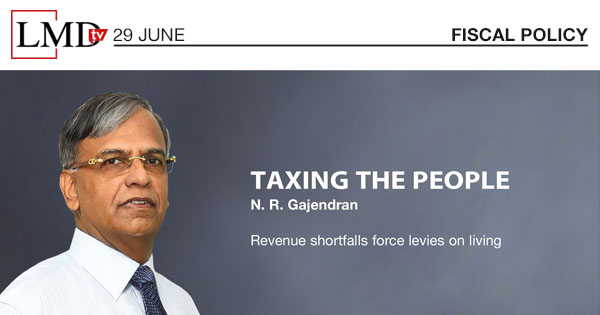The Chairman of the International Fiscal Association N. R. Gajendran, commenting on the government’s delay in enacting proposed tax increases, said: “Most of the tax proposals have to go through the legislative process. However, there are certain proposals such as the increase in value added tax (VAT) to 12 percent, which could be done through a gazette notification and then subsequently be ratified by parliament within a period of three months.”
As the government increasingly requires revenue through taxes, proposals have been included in the policy statement for the reinstatement of Pay As You Earn (PAYE) and withholding taxes, and levies on interest, dividends, rents and services.
“Sri Lanka will revert to a pre-2019 status quo,” he explained, saying that “interest will be subject to five percent and dividends to 14 percent final withholding taxes respectively, just as they were before these were slashed in January 2020.”
Gajendran observed that Sri Lanka’s revenue in 2018 and 2019 was approximately two trillion rupees – a record high.
However, there has been a loss of around Rs. 550 billion in tax revenue in 2020, due to revisions to the budget proposals, the reduction of tax rates and broadening the tax base. Therefore, returning to the 2019 tax data score could recover the 550 billion rupees.
“Inflationary pressure will bring in more money in nominal terms but the full potential of the revised tax proposals will not be attained with the multiple crises that Sri Lanka is facing,” he cautioned.
Continuing in his cautionary tone, he asserted: “Revenues are being proposed but we have to see whether we can have economic activities as well as normal market functions, to get back to some sense of sensible tax – about 12.5-13 percent in 2019 – instead of the eight percent to which it has plummeted after taxes were slashed.”
Commenting on indirect and direct taxes, Gajendran was of the view that “this has been a perennial problem. When there’s excessive focus on indirect taxes, the poorer and marginalised segment of society will suffer significantly due to heavy taxes. The high indirect tax will severely impact the less privileged.”
“Many proponents including the IMF are of the view that subsidies are not the answer as they are given against a specific product, which then benefit every consumer. In its deliberations with Sri Lanka, the IMF pointed out that the vulnerable and marginalised people should be targeted and prioritised to be given relief,” he said.
Gajendran went on to say that “when it comes to Sri Lanka, dealing with cash has always been a challenge because of malpractice and corruption,” reiterating an underlying problem he considered to be a roadblock.
Expounding on taxation, the Founder and Partner of Gajma stated: “Sri Lanka has single rate tax. There should be a multi rate system because an unequal society should have a form of tax that addresses this inequality. There should be standard, luxury and reduced rates for some of the essentials.”
He also observed that exemption could be one possibility and a reduced rate another but that neither has been proposed in the interim budget. And he said: “A country cannot have a standard rate in a society when people’s ability to earn and survive fluctuates. The products needed by the less privileged should reach them virtually with no tax or at a meagre rate of tax.”
“Higher rates of tax on higher levels of income are justified because they [high income earners] have a greater capacity to pay. So there is no harm but all those tax monies should be put to good use and not be used for malpractice and corruption, which Sri Lanka has been a victim of. Our budget is not efficient because our expenditure far exceeds revenue,” Gajendran said in his closing remarks on this edition of LMDtv, referring to the surcharge tax of 25 percent and the perennial problem of mismanagement.






